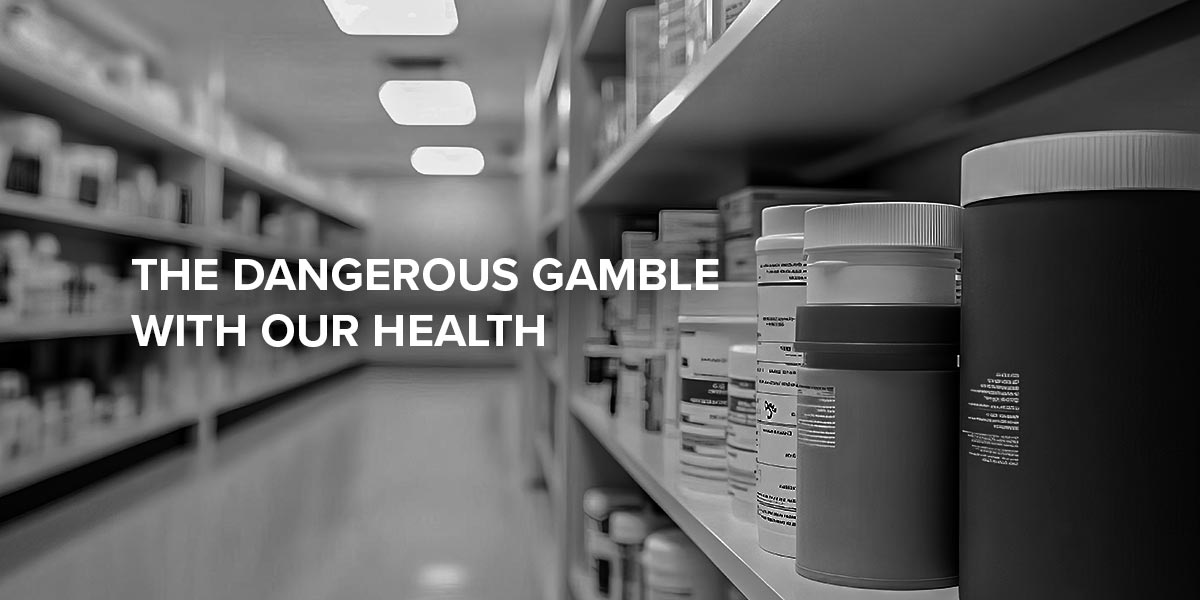How Drugs Are Released Without True Long-Term Safety Knowledge
The Dangerous Gamble with Our Health
In an age where we celebrate advancements in medicine, there is an unsettling reality that’s often overlooked: many drugs are released with limited knowledge of their long-term side effects. While these medications can offer immediate benefits, the long-term risks are often unknown, making patients unwitting test subjects. This lack of foresight and responsibility from pharmaceutical companies is not only concerning—it poses a potential threat to humanity itself.
The Problem: Short-Term Testing, Long-Term Consequences
Most drugs are tested for short-term safety and effectiveness. Clinical trials, often lasting just a few months or years, may reveal some immediate side effects, but they are often too short to identify long-term health risks. Once approved, drugs are rapidly released to the market, widely prescribed, and used by millions. But what about the potential consequences five, ten, or even twenty years down the line? Patients who develop unexpected chronic conditions or severe complications are left with little recourse, struggling to prove a direct link between the drug and their symptoms. Often, by the time the truth emerges, it’s too late for those affected.
The Hidden Dangers: The Inability to Prove Side Effects
One of the greatest injustices patients face is the near-impossible task of proving that a drug caused their long-term health issues. Even when patients feel certain that a specific medication triggered their symptoms, pharmaceutical companies and regulatory agencies can demand scientific proof that is difficult, if not impossible, for individuals to provide. This creates a disturbing paradox: the pharmaceutical companies, who have the resources to investigate these side effects, are also the ones with a vested interest in denying them.
Patients often suffer alone, dismissed as anomalies, while the drug remains on the market. This cycle is not only tragic—it’s dangerous. We’re left to wonder how many more lives will be lost, how many families will be broken, and how much suffering will go unaddressed before anyone in power takes action.
Real-World Examples of Tragic Consequences
The history of modern pharmaceuticals is riddled with examples of drugs that, over time, revealed devastating side effects:
- Thalidomide: Originally marketed in the late 1950s as a treatment for morning sickness, thalidomide was linked to severe birth defects, resulting in thousands of babies born with limb deformities. By the time the drug was pulled, the damage was irreparable, showing how catastrophic the consequences of inadequate testing can be.
- Diethylstilbestrol (DES): From the 1940s to the 1970s, DES was given to pregnant women to prevent miscarriages, despite limited evidence of its efficacy. Years later, it became clear that DES caused rare cancers and reproductive problems in the children of those who took it. DES patients and their children were part of an uncontrolled experiment with life-altering consequences.
- Vioxx (Rofecoxib): A painkiller launched by Merck in the 1990s, Vioxx was marketed as a safer alternative to traditional NSAIDs. However, studies later revealed it significantly increased the risk of heart attacks and strokes. By the time it was pulled from the market in 2004, it had caused an estimated 60,000 deaths in the U.S. alone.
- Finasteride: Marketed for male hair loss and prostate issues, finasteride has been linked to persistent sexual, neurological, and mental health side effects, even after stopping the drug. While cases of Post-Finasteride Syndrome (PFS) are growing, pharmaceutical companies continue to downplay these risks, leaving countless men suffering from long-term side effects that have altered their lives.
The Bigger Picture: A Risk to Humanity
At a humanity-wide level, we risk creating generations of people whose health is compromised by drugs they once trusted. If pharmaceutical companies continue to release drugs without understanding their long-term impacts, and if regulators allow it, the effects could be disastrous. Imagine a future where previously healthy individuals suffer from debilitating chronic conditions simply because a drug they took years ago was rushed to market without adequate testing.
If these trends continue unchecked, we could face a health crisis affecting the collective wellbeing of entire populations. The slow pace of recognition and accountability in the pharmaceutical industry could mean that by the time we understand the true extent of harm, irreversible damage will already be done.
The Need for a More Balanced and Regulated System
This reality calls for a more balanced and accountable health regulatory system where patients have a stronger voice, and pharmaceutical companies are held to higher standards. Here are some steps that could help:
- Longer Testing Periods for Drugs: Drugs with potentially serious long-term effects, such as hormonal treatments, should undergo extended clinical trials before they’re widely prescribed. Short-term testing may reveal immediate side effects, but long-term studies are necessary to understand a drug’s full impact.
- Mandatory Post-Market Surveillance: Even after approval, drugs should be rigorously monitored for any emerging side effects. Patients should be encouraged to report new symptoms, and pharmaceutical companies should be required to follow up on these reports without fear of profit loss.
- Greater Patient Involvement in Regulatory Decisions: Patients who suffer from unexplained side effects deserve a platform to share their experiences, and these reports should carry weight in the drug approval and surveillance process. Pharmaceutical companies should not be the only voice in deciding what constitutes a “safe” side effect profile.
- Transparent Access to Data: Pharmaceutical companies should be required to share clinical trial data publicly. Greater transparency would allow independent researchers to analyse the data, potentially uncovering trends and issues overlooked by the companies themselves.
- Stronger Accountability for Pharmaceutical Companies: If a drug is proven to cause severe long-term side effects, the companies responsible should face meaningful consequences. Fines alone aren’t enough. Regulators must hold pharmaceutical companies liable in a way that prioritises patient health over profit margins.
Conclusion
The pharmaceutical industry has made remarkable contributions to modern medicine, but it’s time for a reality check. Drugs should not be released without a comprehensive understanding of their long-term effects. Patients should not be left to fight alone when they believe their health has been compromised. And society should not have to wait until countless lives are affected to recognise the dangers.
A more accountable, patient-focused approach to drug approval and regulation is not only necessary—it’s overdue. Patients deserve the right to safe, effective treatments, and pharmaceutical companies must be held to higher standards. The stakes are too high to continue gambling with our health.
Learn more about PFS & PSSD
What is Post-Finasteride Syndrome?
Learn more about the devastating disease known as Post-Finasteride Syndrome.
What is Post-SSRI Sexual Dysfunction?
Gain insight on PSSD – Post-SSRI Sexual Dysfunction and it’s life-altering side effects.





